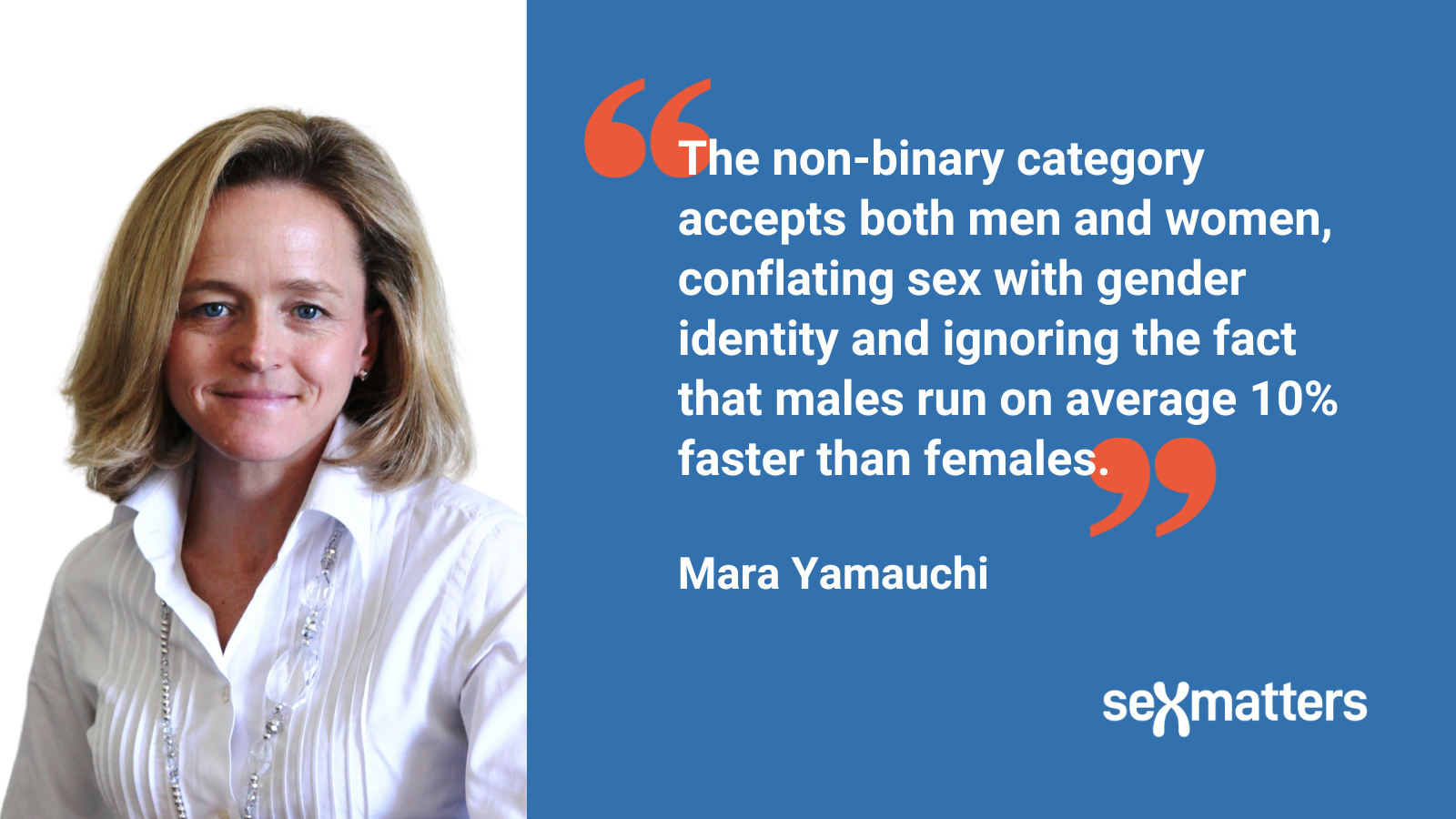The non-binary category in marathons

Mara Yamauchi is the UK’s third-fastest female marathon runner ever and a two-time Olympian. She is a member of Sex Matters’ advisory group and has written this guest blog.
Since 31st March, post-puberty males have been banned from the female category by World Athletics – in world rankings competitions – and by UK Athletics, in events they license. But now there is a new way to allow male athletes an unfair advantage: the non-binary category.
Five of the world’s six most prestigious marathons – Berlin, Boston, Chicago, London, and New York City, the World Marathon Majors – have now adopted this category: only Tokyo has not. The non-binary category accepts both men and women, conflating sex with gender identity and ignoring the fact that males run on average 10% faster than females, so they cannot compete fairly against each other. Its addition provides males with two categories in which to enjoy fair competition, while females have only one. In events where males are allowed in the female category, those numbers will be three against zero.
Last Monday, the Boston Marathon’s non-binary winner was male Kae Ravichandran, who since July 2022 has competed in the female, male and non-binary categories. In second place was female Cal Calamia, who openly states “I take testosterone”. Based on publicly available information, we can deduce that the next five were male, and the top half of the 24 finishers was dominated by males while the bottom half comprised mostly females.
To get a place in the race, non-binary runners had to run the same times as the women. In other words, to qualify for the Boston non-binary category, females had to run the same times as females in the women’s category, but males had the luxury of running thirty minutes slower than their fellow males in the men’s category.
The New York City Marathon’s 2022 non-binary winner and runner-up were also male, and won $5,000 and $4,000 respectively for running modest times: 2:45:12 and 3:09:41.
On Sunday, the London Marathon hosted its inaugural non-binary category. It was only on offer to mass race entrants, not to the elite, championship or Good for Age entrants, and did not offer prize money. Until late afternoon on race day, no data about the non-binary participants seemed to be available on the app or website unless you knew their names. By the evening, the website had non-binary results up, showing that there were 88 finishers. Strangely, even by the evening of Tuesday 25th April, the non-binary runners’ results did not show their age categories, whereas age-category data was available for all the runners in the men’s and women’s categories.
And if the London Marathon was asked to provide data on the sex breakdown of participants, would it be able to? When I looked at the London Marathon online entry procedure in October 2022, the first data field after name and contact details was “Gender”, with the choices female, male or non-binary. Perhaps non-binary entrants were asked their sex later. In February, UK Athletics issued guidance to race directors warning them that the Information Commissioner’s Office had ruled that there are problems with collecting gender-identity data, and that asking the question “What is your gender?” (male/female/non-binary) conflates sex and gender identity, and cannot be answered accurately.
In the Jersey City Marathon & Half Marathon in the USA on 23rd April, there was a non-binary category with prize money in the elite, sub-elite and seeded sections. In all of those, the qualifying times required were in between the men’s and women’s qualifying times – as if those who identify as “non-binary” are magically part man, part woman. In some cases, the non-binary times were not exactly half-way between, with some being closer to the men’s times, and others closer to the women’s times. What this meant was that males could qualify running slower times than they needed to qualify for the male category, but that women needed faster times to compete as non-binary than to run as women.
The key promoter of the non-binary category in running is Jake Fedorowski, who from publicly available information qualified for Boston under the non-binary/women’s times (3:30:00) but not under the men’s times (3:00:00) for his age. His Guide to Non-Binary Inclusion in Running is a Stonewall-style list of onerous demands, including equal prize money for men, women and non-binary runners, a very specific type of all-gender toilets, and lead bicycles for the non-binary runners. In it he also appears to call for the abolition of categories altogether.
